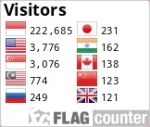The Use of Magic in the Village Head Election in Tidore Islands City Indonesia
DOI:
https://doi.org/10.26623/julr.v7i3.10519Keywords:
Indonesia, Role, Supernatural, Village Head ElectionAbstract
In Indonesia, the Village Head Election is the implementation of people’s sovereignty to choose village heads in a direct, public, free, confidential, honest, and just manner as stated in Regulation of the Minister of Internal Affairs No. 27 of 2020. This paper aims to analyze deviant behavior in the Village Head Elections that may bring harm to other people that involve the role of supernatural beings committed by Village Head Election participants. The importance of learning magic for the Village Head Election includes: (1) to influence the opinion of society who have suffrage rights; (2) to manipulate the obtainment of votes; (3) to make other Village Head Election participants die and/or sick; and (4) to influence the opinion of Village Head Election organizers. This paper employed the juridical empirical research method in the field of the legal anthropology scientific discipline. It used the behavioral approach. This paper aims to understand how mystical practices may influence election results that should ideally be carried out in a just and honest manner as well as to increase awareness of the risk of unethical behavior in the election process. Results showed that mystical things are always closely related to the culture of the Indonesian nation from era to era, including in its political culture. It can be seen that in every leadership of national figures, mystical activities are practiced. Contestants will visit shamans by sending voodoo to their political opponents so that they can win the political contestation. Apart from that, there are those who carry out rituals that are believed to be effective as a way to win the contestation in the political realm. The novelty of this research is that authors not only analyze the magical aspect of the Village Head Elections but also how magic is believed and implemented at the national level. The implication of this case is that it is rather difficult to prove magical cases. Thus, it leads to the occurrence of widespread suspicion among all parties.References
Ahmad, Ahmad, and Novendri M. Nggilu. “Denyut Nadi Amandemen Kelima UUD 1945 Melalui Pelibatan Mahkamah Konstitusi Sebagai Prinsip the Guardian of the Constitution.” Jurnal Konstitusi 16, no. 4 (2020): 785–808. https://doi.org/10.31078/jk1646.
Anggriana, L., S. Oktavia, R. Rahmansyah, and L. Rahimah. “Jimat Dan Mistisme Pengikut Tarekat Syattariyah Di Sumatera Barat Abad Ke-19 M.” Hijaz: Jurnal Ilmu-Ilmu Keislaman 1, no. 3 (2022): 144–155. https://doi.org/10.57251/hij.v1i3.913.
Anonymous. Mysticism, Related to the Rise and Fall of Soeharto. Jakarta: Pustaka Pusat, 1998.
Arini, Ratih Tyas, Moh. Yasir Alimi, and Gunawan Gunawan. “The Role of Dukun Suwuk and Dukun Prewangan in Curing Diseases in Kediri Community.” Komunitas: International Journal of Indonesian Community and Culture 8, no. 2 (2016). https://doi.org/10.15294/komunitas.v8i2.4461.
Bahaudin. “Mistik Dan Politik: Praktek Perdukunan Dalam Politik Indonesia.” Jurnal Keamanan Nasional 1, no. 3 (2015): 365–386.
Bakti, Indra Setia, Alwi Alwi, and Saifullah Saifullah. “Eksistensi Dukun Di Tanah Gayo.” Jurnal Sosiologi USK 12, no. 2 (2018). https://jurnal.usk.ac.id/JSU/article/view/12599.
Barokah, F. “Mistisisme Politik: Eksistensi Magis Dalam Perpolitikan Indonesia.” JIIP: Jurnal Ilmiah Ilmu Pemerintahan 8, no. 1 (2023): 1–19. https://doi.org/10.14710/jiip.v8i1.13275.
Bouk, H. S. “Metafisika Politik Menimbang Kekuatan Aristokrasi Dalam Pilkada Belu Dan Malaka Tahun 2020.” JAP Unwira 3, no. 2 (2020): 130–140. https://doi.org/10.30822/jap.v3i2.867.
Chalik, A. “Sintesis Mistik Dalam Kepemimpinan Politik Jawa.” JRP (Jurnal Review Politik) 5, no. 2 (2015): 254–278. https://doi.org/10.15642/jrp.2015.5.2.254-278.
Dharma, L. A., I. P. Hapsari, and H. Iskandar. “Analisis Kriminalisasi Terhadap Santet Sebagai Tindak Pidana.” Aktivisme: Jurnal Ilmu Pendidikan, Politik, Dan Sosial Indonesia 1, no. 3 (2024). https://doi.org/10.62383/aktivisme.v1i3.349.
Dimyati, Khudzaifah, and Kelik Wardiono. Metode Penelitian Hukum. Surakarta: Universitas Muhammadiyah Surakarta, 2004.
Endaswara, Suwardi. “Falsafah Kepemimpinan Jawa.” UNY, 2019.
Faisal, D. P. Rahayu, A. Darmawan, M. Irfani, and A. Muttaqin. “Pemaknaan Kebijakan Kriminal Perbuatan Santet Dalam RUU KUHP.” Jurnal Pembangunan Hukum Indonesia 5, no. 1 (2023). https://doi.org/10.14710/jphi.v5i1.220-232.
Fatih, Sholahuddin Al. Perkembangan Metode Penelitian Hukum Di Indonesia. Malang: UMM Press, 2023.
Fermadi, Bayu. “Transformasi Santri Pasca 1965.” Jurnal Ilmiah Spiritualis: Jurnal Pemikiran Islam Dan Tasawuf 6, no. 1 (2020): 75–94. https://doi.org/10.53429/spiritualis.v6i1.78.
Gunadi, Gunadi. “Tradisi Pulung Pada Pemilihan Kepala Desa Di Desa Kramat Kecamatan Bungah Kabupaten Gresik (Studi Tentang Antropologi Politik).” UIN Sunan Ampel Surabaya, 1995. https://digilib.uinsa.ac.id/27119/.
Helms, Ludger. “Leadership Succession in Politics: The Democracy/Autocracy Divide Revisited.” The British Journal of Politics and International Relations 22, no. 2 (2020): 328–46. https://doi.org/10.1177/1369148120908528.
Hidayaturrahman, M., and S. Sudarman. “Kiai and Political Relations Reconciling Politics and Religion in Indonesia.” Al-Tahrir: Jurnal Pemikiran Islam 18, no. 2 (2019): 371–94. https://doi.org/10.21154/altahrir.v18i2.1384.
Hobson, N. M., J. Schroeder, J. L. Risen, D. Xygalatas, and M. Inzlicht. “The Psychology of Rituals: An Integrative Review and Process-Based Framework.” Perspective on Socio Psychological Review 3, no. 2 (2018): 260–84. https://doi.org/10.1177/1088868317734944.
Huda, M. D. “Peran Dukun Terhadap Perkembangan Peradaban Budaya Masyarakat Jawa.” Jurnal Ikadbudi 4, no. 10 (2015). https://doi.org/10.21831/ikadbudi.v4i10.12029.
Humaeni, A. “Ritual, Kepercayaan Lokal Dan Identitas Budaya Masyarakat Ciomas Banten.” Jurnal El Harakah 17, no. 2 (2015). https://doi.org/10.18860/el.v17i2.3343.
———. “Ritual, Kepercayaan Lokal Dan Identitas Budaya Masyarakat Ciomas Banten.” Jurnal El Harakah 17, no. 2 (2015). https://doi.org/10.18860/el.v17i2.3343.
Humaeni, A., and F. Ushuluddin. “Penggunaan Magic Dalam Politik Lokal Di Banten The Use of Magic in Local Politics of Banten.” Masyarakat, Kebudayaan, Dan Politik 27, no. 1 (2014): 14–26. https://doi.org/10.20473/mkp.v27i1.2264.
Kapferer, Bruce. Beyond Rationalism: Rethinking Magic, Witchcraft, and Sorcery. Oxford: Berghahn Books, 2003. https://doi.org/10.3167/9781571814180.
Malik, M. I. “Peran Kiai Sebagai Tokoh Sentral Dalam Masyarakat Desa Tieng Kejajar Wonosobo.” QuranicEdu: Journal of Islamic Education 2, no. 2 (2023). https://doi.org/10.37252/quranicedu.v2i2.355.
Malinowski, Bronislaw. Magic, Science and Religion: And Other Essays. Michigan: Doubleday, 1954.
Maslihun, Maslihun. “Penggunaan Jasa Dukun Dalam Pemilihan Kepala Desa Di Desa Karangrejo Kecamatan Pucakwangi Kabupaten Pati: Tinjauan Aqidah Islamiyah.” IAIN Walisongo, 2011.
Mawardi, M. “Persepsi Masyarakat Terhadap Peran Kiai Di Daerah Istimewa Yogyakarta.” Jurnal Analisa 20, no. 2 (2013): 133–43. https://media.neliti.com/media/publications/42016-ID-public-perception-on-the-role-of-kiai-in-yogyakarta.pdf.
Muali, C., Moh. Rofiki, H. Baharun, Z. Zamroni, and Lukman Sholeh. “The Role of Sufistic-Based Kiai Leadership in Developing the Character of Santri in the Pesantren.” Al Ishlah 3, no. 1 (2021). https://doi.org/10.35445/alishlah.v13i3.1012.
Mujahid, Imam. “Islamic Orthodoxy-Based Character Education: Creating Moderate Muslim in a Modern Pesantren in Indonesia.” Indonesian Journal of Islam and Muslim Societies 11, no. 2 (2021): 185–212. https://doi.org/10.18326/ijims.v11i2. 185-212.
Najah, Nailun. “Dampak Keterlibatan Kiai Dalam Politik Terhadap Pengembangan Sistem Pendidikan Pondok Pesantren Sabilul Hidayah Bangkalan.” Joecie 1, no. 1 (2022). https://doi.org/10.62005/joecie.v1i1.10.
Novitasari, Della Aura. “Perubahan Bentuk Relasi Dukun Dan Masyarakat Desa Ranggeh, Kabupaten Pasuruan.” Kusa Lawa 1, no. 2 (2021): 95–104. https://doi.org/10.21776/ub.kusalawa.2021.001.02.07.
O’Keefe, R. D. “Innovative Attitudes, Values, and Intentions in Organizations.” Journal of Management Studies, Wiley Blackwell 19, no. 2 (1982): 163–82. https://doi.org/10.1111/j.1467-6486.1982.tb00066.x.
Rahayuningtyas, Etis Duhita, and Tenny Setiani Dewi. “The Radiographic Finding of Charm Needles in a Woman with Orofacial Pain.” Jurnal Kedokteran Gigi Universitas Padjadjaran 32, no. 2 (2020). https://doi.org/10.24198/jkg.v32i2.23831.
Rashid, Saifur. “Meaning and Rituals of Death: An Insight into Selected Ethnic and Religious Communities of Bangladesh.” Vietnam Social Sciences 5, no. 193 (2019).
Rohim, Z. T. A. “Pesantren Dan Politik (Sinergi Pendidikan Pesantren Dan Kepemimpinan Dalam Pandangan KH. M. Hasyim Asy’ari).” Jurnal Pendidikan Agama Islam (Journal of Islamic Education Studies) 3, no. 2 (2015): 323–45. https://doi.org/10.15642/jpai.2015.3.2.323-345.
Susen, S. “The Interpretation of Cultures: Geertz Is Still in Town.” Sociologica 18, no. 1 (2024): 25–63. https://doi.org/10.6092/issn.1971-8853/18664.
Syukur, Yanuardi. “Democracy, Corruption and the Politics of Spirits in Contemporary Indonesia.” Muslim Politics Review 2, no. 2 (2023). https://doi.org/10.56529/mpr.v2i2.207.
Tony, Daud. Dunia Santet. Jakarta: Penerbit Betlehem, 2009.
Wantu, Fence M., and Abdul Hamid Tome. “Dynamics of Village Head Election Arrangements.” Jambura Law Review 3, no. Special Issue (2021): 96–116. https://doi.org/10.33756/jlr.v3i0.8783.
Wardiono, Kelik. “Prophetic: An Epistemological Offer for Legal Studies.” Journal of Transcendental Law 1, no. 1 (2019): 17–41. https://doi.org/10.23917/jtl.v1i1.8797.
Wathani, Kharisul. “Pesantren Dalam Politik Dan Kebijakan Pendidikan Di Indonesia.” Maalim: Jurnal Pendidikan Islam 1, no. 2 (2020): 128–40. https://doi.org/10.21154/maalim.v1i02.2628.
Yuniarto, B., D. R. Kolbi, R. Marliani, and T. Mamlakah. “Persepsi Masyarakat Terhadap Dukun Dalam Pandangan Islam.” Jurnal Sosial Dan Sains 2, no. 11 (2022): 1160–1169. https://doi.org/10.59188/jurnalsosains.v2i11.521.
Downloads
Additional Files
Published
Issue
Section
License
The journal holds the copyright for each article published with work licensed simultaneously under a Creative Commons Attribution 4.0 International License, which allows others to share the work with an acknowledgment of the authorship and early publication of the work in this journal.










